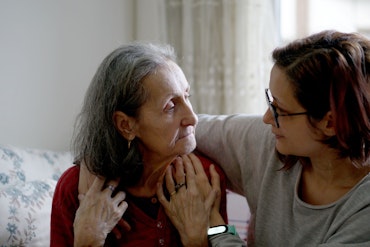WA welcomed to national aged care system
The transition to a “truly national” aged care system is almost complete as the Commonwealth Government prepare to take over control and introduce Western Australians to the Commonwealth Home Support Programme (CHSP) as of 1 July 2018.

CHSP services include help with showering, getting dressed, preparing meals, housework, shopping and transport (Source: Shutterstock)
Older Australians across all other states and territories have been supported in their entry-level home care through the CHSP since the rollout from the state-run Home and Community Care (HACC) program began in 2015, with Western Australia being the final piece to the national puzzle.
Federal Minister for Aged Care Ken Wyatt announced Western Australia’s transition to CHSP from HACC in early 2017, highlighting that the move would create a truly national aged care system, and more integrated disability services for people aged 65 and over.
“From 1 July 2018, the Australian Government will assume full funding, policy and operational responsibility for HACC services in Western Australia for over 65s,” he says.
“The changes are consistent with arrangements across the other states and territories and will allow us to provide consistent service and support to people as they grow older, no matter where they live.
“The changes mean that the Australian Government will support older West Australians to remain in their homes, for as long as they can and wish to do so.”
Through the CHSP, older Western Australians aged over 65, and Aboriginal or Torres Strait Islander People aged over 50, who are mostly – but not completely – able to live and cope on their own, will be able to access a range of aged care assistance at home, including help with showering, getting dressed, preparing meals, housework, shopping and transport.
The program can also offer support to carers of older Australians.
While the biggest change associated with the transition to CHSP is that it will be Federally funded and run, and assessed and entered into through My Aged Care, there are a number of changes and new additions to the supports historically offered through HACC.
The main changes include a twice yearly reporting period for CHSP service providers instead of quarterly, the mandatory requirement for staff, volunteers and executive decision makers to have police checks every three years, as well as the introduction of wellness and reablement annual reporting.
Minister Wyatt says the Commonwealth and Western Australian Governments have been working hard, and together, to make the move to the CHSP “as smooth as possible” and to minimise the impact on providers and clients.
“I have seen first-hand the enormous benefits of this program and how it helps older Australians to remain living at home in their local communities, close to their families and friends,” he explains.
“The transition will ensure older Australians who have been receiving HACC support experience no change in services – the funding will give certainty to the provider organisations, to ensure they continue to deliver high-quality services to the more than 62,000 West Australians who rely on their support.
“The Commonwealth will offer the same level of funding that is currently allocated to eligible HACC services for older people.”
He adds that the transition of HACC services to the CHSP is similar to arrangements across all other States and Territories and will allow Government to provide consistent home support services to people as they age.
The Minister also notes that an additional $2.3 million will also be given to support the providers that are moving to the CHSP by offsetting some of the costs that may be incurred through this process.
This funding will cover the costs of providers that need to update their systems and processes to meet the CHSP requirements.























